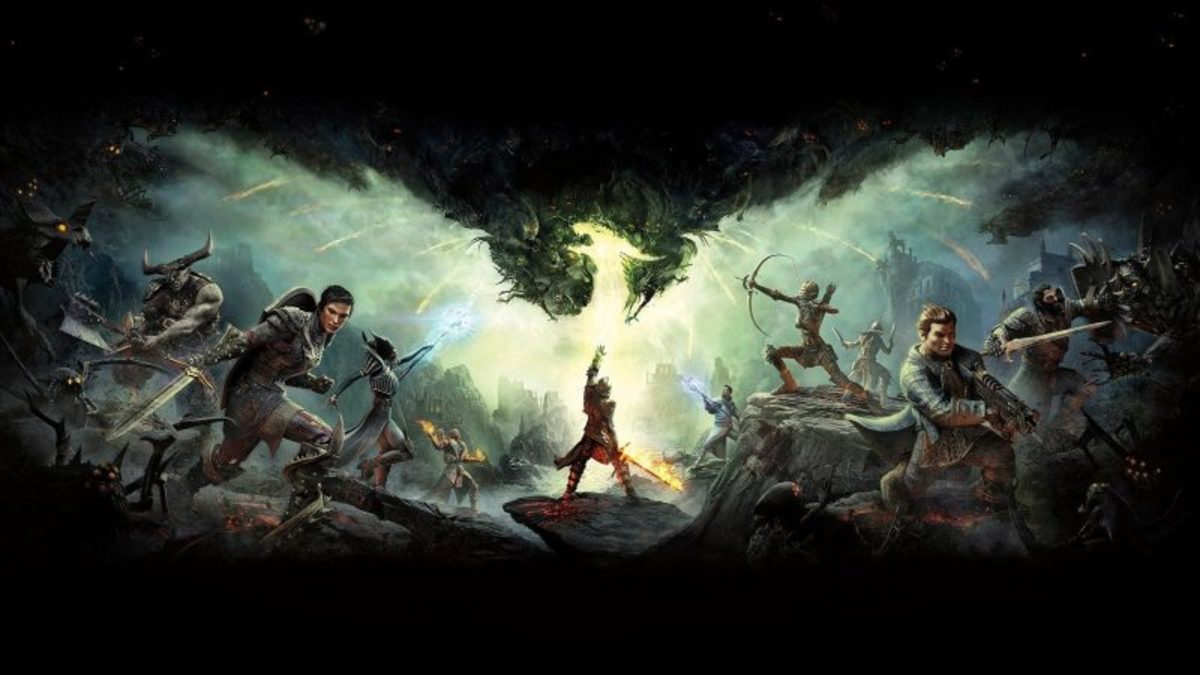- HubPages»
- Games, Toys, and Hobbies»
- Computer & Video Games»
- Roleplaying Video Games»
- Western Roleplaying Video Games
Dragon Age Inquisition's failure to simulate leadership
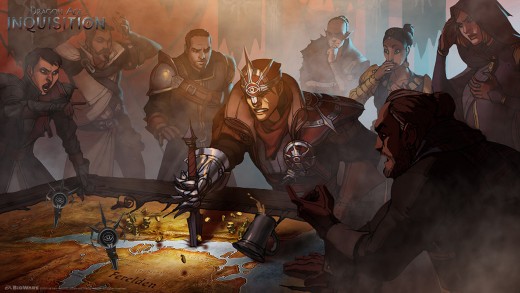
Dragon Age: Inquisition, the third game in the franchise, ups the ante and scale by promoting the player from a standard adventurer into the leader of a pseudo-religious (military) faction, the Inquisition. In theory, this rise in station should open all kinds of interesting dynamics into the story driven morality-decisions that made Bioware well known with both the Mass Effect and Dragon Age franchises. In practice, however, the game falters to give the player the impression that you lead much at all. At best, the game offers a few moments of throne sitting in order to pass judgment over a character. But a majority of your leadership duties come down to the player doing superfluous tasks and delegating which advisor deals with what nebulous, inconsequential task.
While Dragon Age Inquisition promises to endow the player with the power “shape the world around you. As a leader, you can deploy followers of the inquisition to act on your behalf…decide the make up of your inquisition forces.” Instead, all the leadership aspects of the game come across as hamfisted diversions into to the typical plucky adventurers save the world formula, creating a degree of dissonance between what the game tells your role in the game is and what your role turns out to be.
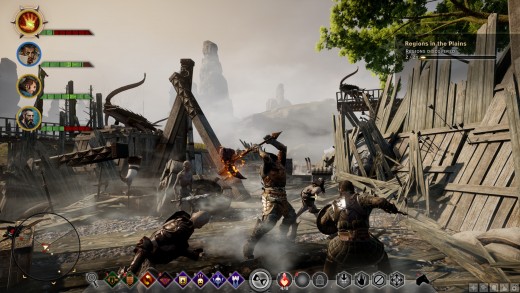
Field Work
One of the more odd and aggravating is the amount of work your character does out in the field. Your character seems to do at least ninety percent of the work in expanding the Inquisition sphere of influence. Everything from gathering herbs and minerals all the way down to single-handedly besieging a fortress filled with demon’s by yourself. All the while, the various members who make up the body of the Inquisition do nothing.
Admittedly, some of this makes sense, especially in the early going where many are suspicious of you and the mysterious power you seem to wield. Yes, your Inquisitor is the only one capable of closing the Rifts (demon portals) that plague the land. But once I gain my allies trust and am formally labeled the leader of the Inquisition, should I really be the one running around picking the herbs to make potions?
Am I the only person who can dig up minerals so i can create better gear?
Do I personally need to fight every bandit in a region to help stabilize it and gain influence for the Inquisition?
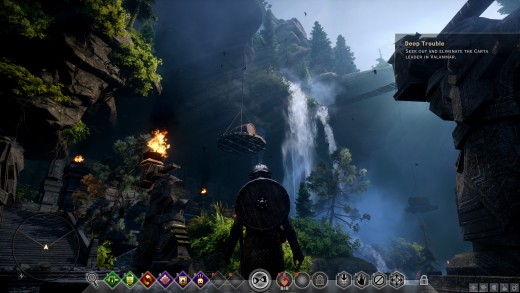
A lot of resources go into making enormous, lavish regions as the setting for various tasks and fights. Sadly the same amount of energy does not go into what you do in the landscapes. To me, there is a difference between leading from the front and being the work horse, with your Inquisitor filling the role of the workhorse. While you fight bandits, solve minor squabbles, or collect shards for a seemingly vague reason outside of metagame payoff, your characters affect very little. Even when you set up camps or fortress, the occupants, your soldiers, never really do anything nor the does the game offer the player an option to give them an order. You cannot order them to canvas the area and solve anything trivial, or to gather herbs and minerals while patrolling the area. Instead, it is your job, as top Inquisitor of the Inquisition, to do any and all things.
Many of the quests you get in the open regions feel at odds with the premise of leading the Inquisition in order to help save the world from an existential threat:
Place flowers at a grave for a widower.
Help a scavenger get back a ring she found that has been taken by spiders.
Find supply caches for someone else’s military to use.
Investigate a couple’s elopement.
While not every side quest feels as uninspired as these examples, more than enough of them do seem like nothing more than filler content. These feel less like activities worthy of someone leading an international feudal power during an existential crisis and more like chores. This creates a large disparity between what your character’s role in the world/narrative is and what the game gives the character to do. It also creates a large buffer time between some of the main missions which can create some odd pacing issues. These side quests feel more suitable for a character or group just beginning their career as an adventurer, not for someone who, supposedly, has a military at their command. Shouldn’t I be able to delegate some of these tasks to underlings while I focus on the major catastrophes?
Accomplishing these menial tasks earns you “Influence” which is just another kind of experience point that goes towards leveling up your Inquisition, which in turn only unlocks perks that improve only your character, the Inquisitor. These perks are indirect improvements for your character, such as gaining more experience, opening up more dialogue options about X, granting more crafting schematics, etc. You also accrue “Power” which is merely a currency that you use to unlock new regions or story missions. In metagame terms, this structure appears to simply give an endless list of chores before you can go play the main missions. This puts the Inquisitor at odds with what it means to be the Inquisitor. Instead, during these open portions of the game, you seemingly cease being the Inquisitor and become just another adventurer doing odds and ends.
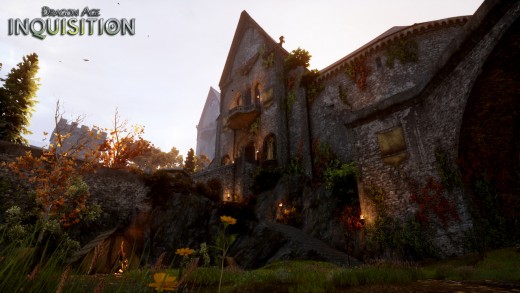
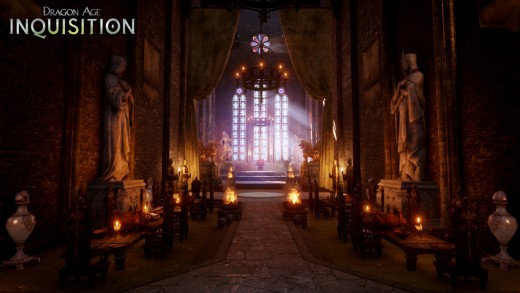
Headquarters
You eventually receive your own headquarters as the story progress, a castle named Skyhold, a place where everyone in the Inquisition can sharpen their knives. For all intents and purposes, it is the Normandy from the first three Mass Effect games: a place you interact with your party members and supporting cast, manage equipment, etc. Unlike the Normandy, however, it is enormous and time consuming to move around in. Bioware always broke up the Normandy into bite-sized portion which allowed the player to access only the parts they wanted when they wanted to (at least eventually it got that way). This grandeur becomes exhausting as the game requires many trips back.
Aside from the expansiveness, I also never felt particularly invested in Skyhold as an extension of either my character or the Inquisition as a faction. The game offers the player a few cosmetic options, such as different glass panes or heraldry or throne to sit on, but it never served as a much beyond a place to meet characters and home for my character. Skyhold feels more like a readymade home that contains nothing other than the NPCs and party members. This prefabricated castle denies the player the option to use Skyhold as a manner of expressing their character as a leader: do you want a spartan citadel meant to intimidate enemies and allies alike, or a beacon of hope and refuge in a time of catastrophe and upheaval.
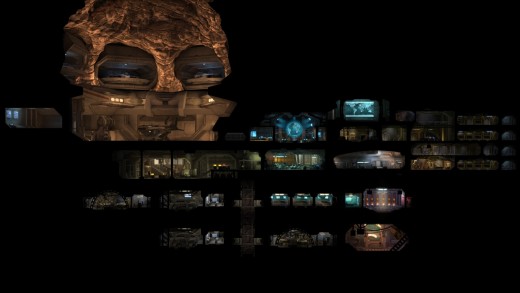
Opposite this is X-Com: Enemy Unknown, where the game directly ties success to the growth and development of your Base. The player needs to smartly decide what kind of compartments and rooms to build, where and when for the most benefits. This keeps the player an active participant and requires a degree of management in choosing what goes where and how best to make use of the assets and resources currently at hand while also trying to predict future needs. I am not saying Dragon Age: Inquisition needed such a degree of involvement or dependence in Dragon Age Inquisition that X-Com gives, but even something like Mass Effect 2’s Normandy Upgrades that later serve to help when going through the Omega Relay. Those cutscenes give a sense of personal success or failure as each upgrade gets tested during that encounter. Giving choices and options beyond simple cosmetics would have gone a lot farther in giving the player a chance to express themselves as both a character and a leader. Various upgrades could actually grant benefits to the Inquisition a political/military faction, to help reinforce that the castle as not merely the players home but a place of operation. Instead Skyhold feels like an immense, mostly empty, structure that wastes the player time in trying to navigate it regularly. The Normandy could get away with this because it was an already made spaceship, but also because it was not the headquarters for anything, whereas Skyhold is supposed to be the heart of the Inquisition.
Personally, I might have rather preferred a few menus off the world map, like Fire Emblem: Awakening, which performs almost all the same functions, at least the primary ones (no decorating in Fire Emblem games). This kind of striped down nature would not give off the impression that time and resources were spent on something utterly tertiary to the game’s experience, nor would constant returns to it wear down the player.
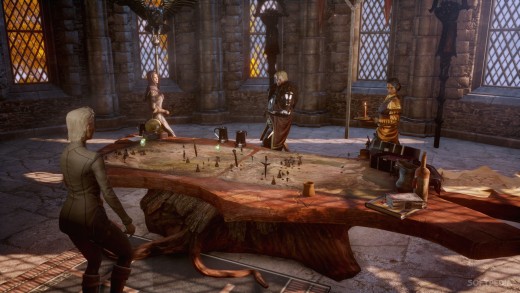
The War Table
While a step up from Mass Effect 3 inane and purposeless War Assets, Dragon Age Inquisition’s War Council still fails at the macro level of leadership or conflict. You exert little control over the activity or demeanor of the Inquisition you lead. Outside a few mandated plot points, the actual manpower the Inquisition possesses, or lacks, never seems to be an issue nor is your relationship with the neighbors, Ferelden and Orlais, much a concern either. Everything seems to go well until the game decides it is not.
Bioware confines the extent of your Inquisitor’s leadership to the War Table, which breaks down to something of a world map, with various operations spread across it. You click on one these operation icons and are given a brief description of an offstage event or incedent. You are then prompted to select one of your three advisors to handle it: Cullen, commander of your military, Leliana, your spymaster, and Josephine, your chief diplomat. After choosing, a clock starts counting down until chosen advisor reports success. And that is the degree of your leadership or involvement in the grander scheme of the Inquisition.
These tasks always succeed, no matter who you choose. The only thinking involved is looking at who takes the least amount of time to report back, making it merely a choice whose time you want to waste. It is never a question of what the implications are of sending the military to handle something instead of using diplomats or assassins. There is not fallout, no consequences, nor failure. The War Table requires no real participation from the player and guarantees success and reward. This really frees up your time to go help that widower with the flowers.
Other games found much more direct and exciting ways to represent and simulate leadership. X-Com: Enemy Unknown constantly places you against the approval of your funding nations, where ignoring their plights causes them to back out on the cause, reducing your income and eventually leading to a game over. Most random missions come in batches with circumstances allow you to only respond to one such catastrophe, creating tension with those you chose not to aid. This also excludes resource and money management of the Base, which I’ve already mentioned.
Assassin Creed 4: Black Flag had the trade Armada minigame that is and improved version of the War Table even though it predates Dragon Age Inquisition by a year. The Naval Fleet has two sides:1) the time consuming mission tasks [which seem an improved version of Final Fantasy Tactics’ Bar propositions] and 2) the naval conflicts which play out like simplified SNES RPG battles. You the player build this fleet by capturing ships during the main part, and each ship possess class with varying stats which play importance in both the battles and dispatch missions. Dragon Age Inquisition just merely has the clock counting down, meaning the War Table lacks any drama or even semblance of challenge to replicate the ongoing struggle beyond your character’s scope and view. They are simply rewards for continuing to play the game. Even the much derided Bureau: X-Com Declassified implemented a better system by requiring you to send out actual team members on their own to handle minor operations, which could result not only in failure but in said characters death.
If Dragon Age Inquisition truly endeared itself to the intricacy and challenge of leadership, wouldn’t a kind of approval system for the two adjacent countries add intrigue to the War Table decisions? Using your army to settle a border dispute might lower both, which could lead to a reduction in how you are viewed in one country which could limit your ability to venture in that country or open up more locations and quests. What about a simple “Public Opinion” meter in place of the good vs evil (paragon vs, renegade) meter? Where the decisions you make as a leader allow for a reputation that precedes us and could even be at odds with how our character acts in person. Instead, the only people impacted by or responding to your choices are your party members and that does not count as a measure of your leadership.
These suggestions don’t strike me as too far out of the realm of possibilities, especially considering Dragon Age’s theme of “moral ambiguity.” The War Table just seems like a slapped on addition to give the illusion of leadership, but pales in comparison to other such “leadership” minigames/diversion as it adds no value or entertainment to game. While the naval fleet of Assassin Creed’s: Black Flag is not the best simulation of leadership, as oppose the dedication found in X-Com, it at least is built around player interaction and grants control over something offstage with a degree of adversity and consequences. Dragon Age: Inquisition’s War Table, instead, gives the impression that anyone could lead the Inquisition with substantial success, which runs counter to the sense of crisis Bioware built the game around, or at least its narrative.
Also, the over simplification of the Inquisition’s capabilities hamstrings your capacity to lead. If you choose to use your military might to settle one of the War Table incidents, the task seems to occupy the time of your entire military, which makes little sense for the prolonged conflict the game claims is occurring. The game would benefit from simply recruiting NPC agents throughout the world that fall into the three categories of Military, Subterfuge, or Diplomacy which you in turn you send those out to handle the various incidents around the map as they occurr. If you’ve been tyrannical and ruthless in your dealings instead of attracting/recruiting subordinates, the amount of operations would pile up and you’d realize just how outmatched and under resourceful your Inquisition truly is. Even adding a kind if time sensitive nature to each War Council map event would create tension like the UFO sequences do in X-Com: Enemy Unknown and again would highlight your number of agents. Furthermore, not doing an operation before expiring could affect a countries opinion of you (if such a mechanic were used). And hey, those NPC agents would even allow Bioware the opportunity for more returning characters from old Dragon Age games or such, enriching the experience for long term fans so they could learn more directly what happened to who in the evolving world and granting a more direct glimpse into the franchise’s gallery of personalities for newcomers.
But instead, Bioware decided to create a simple and pointless system of obscured delegation with little tribulation or effect. Sure it gives the illusion of leadership through delegation, but it isn’t delegating so much as it is just signing your name on a report. The constant success and lack of player interaction unravels the illusion pretty quickly and makes it easily forgettable, if not simply ignorable. This alienates the player from the large scale nature of the Inquisition and the scope of the conflict it is engaged with.
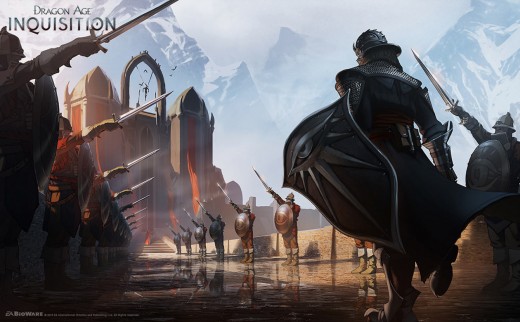
Some of this can simply be deemed my disappointment at how Dragon Age Inquisition turned out. Some of that is true. Though, I found the game okay, but not great, much less game of the year for 2014 (which should have been Dark Souls 2). Somehow I got through this article without mentioning my favorite strategy game, Gemfire.
But I kept asking myself one question throughout my entire playthrough of Dragon Age Inquisition: What was the point of making my character the Inquisitor, leader of the Inquisition, if it barely has anything to do with the game?

This hub was written for Critical Distance and its series Blogs of the Round Table, and other articles in the October series, Leadership, can be found here.



